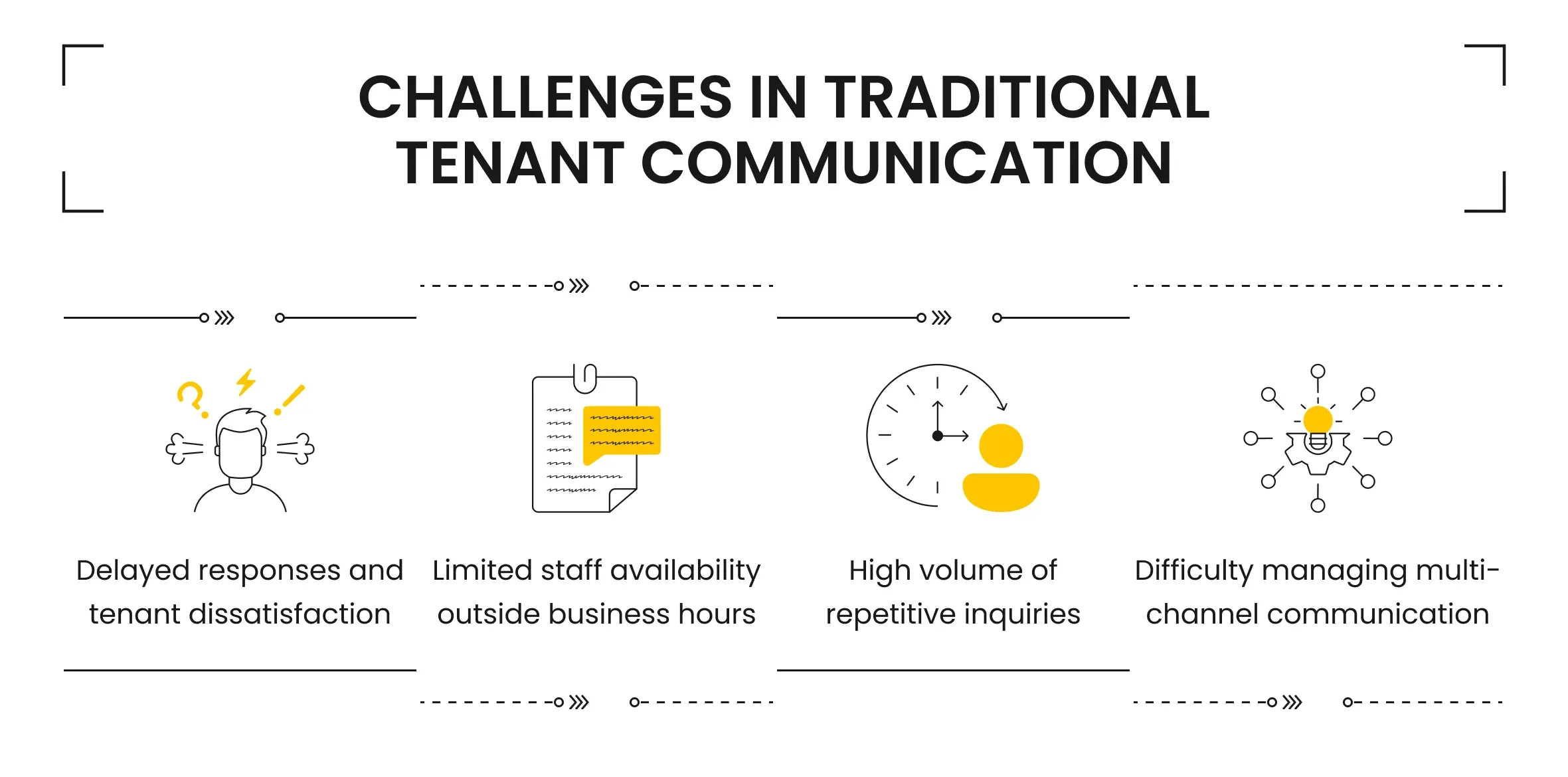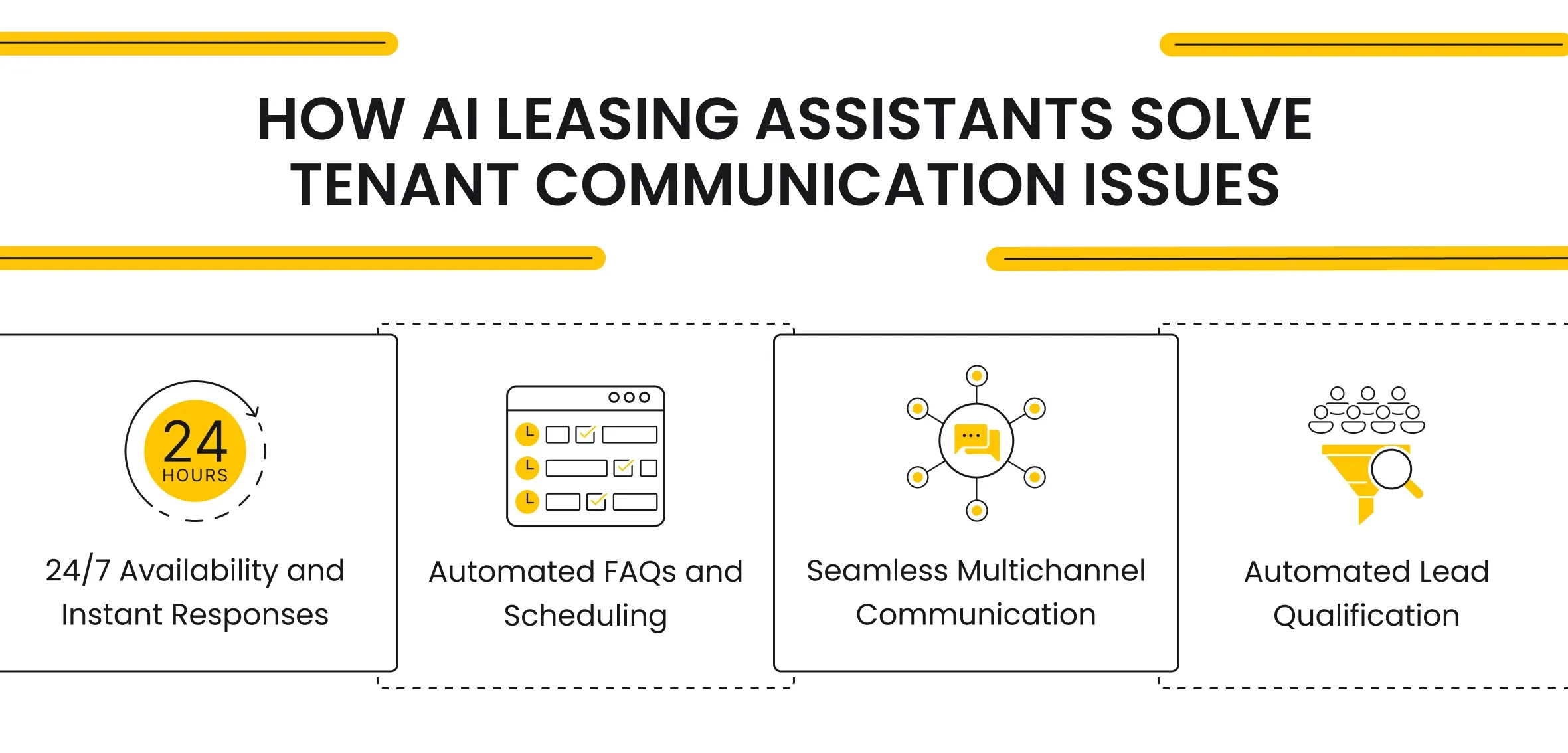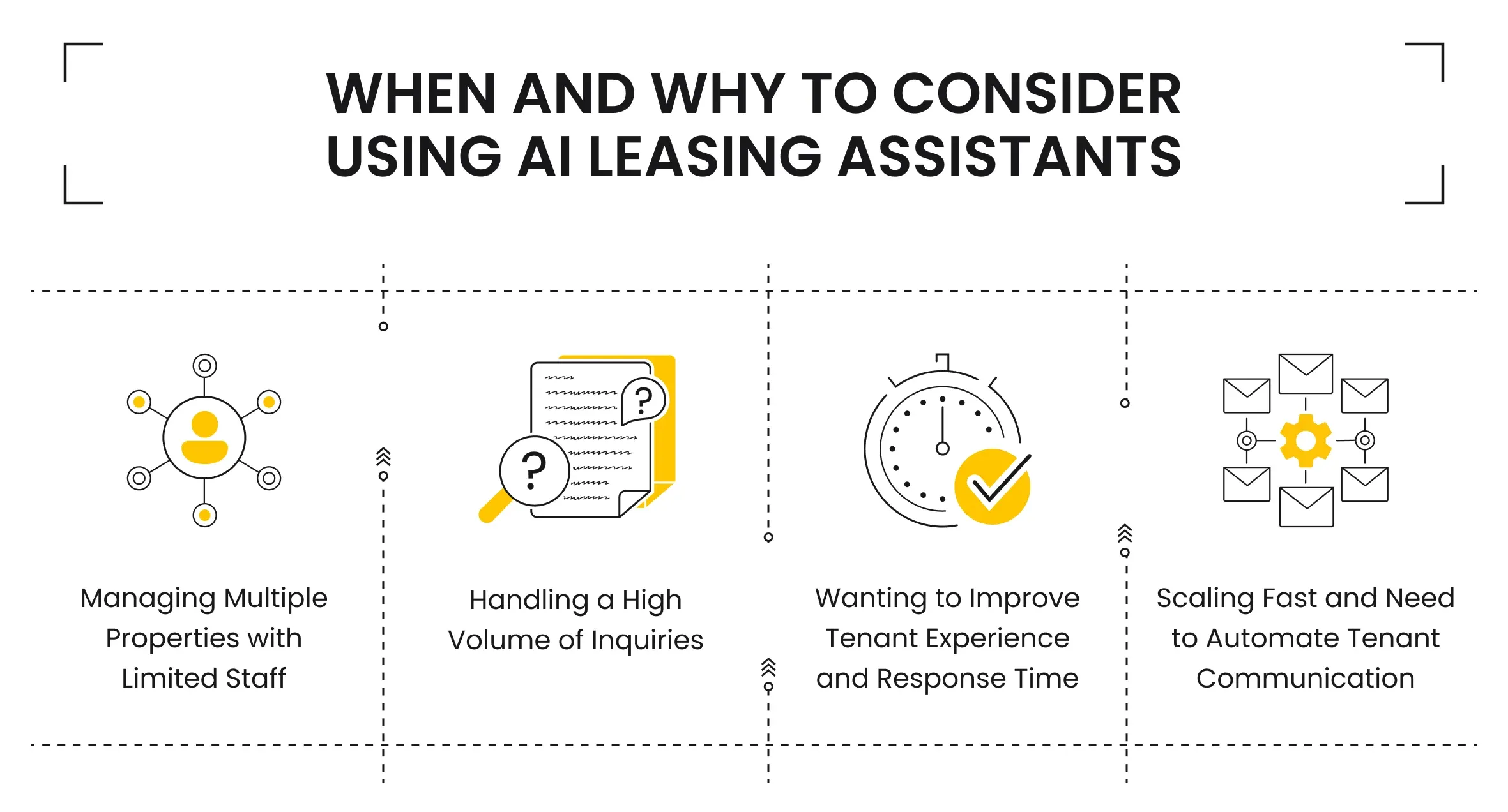Real Estate
How AI Leasing Assistants Simplify Tenant Communication
April 29, 2025 • 130 Views • 20 min read
Bohdan Vasylkiv
CEO & Co-Founder
The era of artificial intelligence is here. Such software tools can handle countless tasks and requests, providing users with accurate and quick responses on any potential topic. However, this is possible only if your AI is properly trained and has access to relevant data.
Therefore, we would like to discuss AI leasing assistant solutions, how they differ from generic or other types of artificial intelligence or chatbots, and consider the value these tools can bring to your business.
Real Estate AI Assistant Explained
First things first, we have to explain the ground terms. The term "artificial intelligence" itself has become a buzzword, making it senseless to explain what it is and how to use such technology.
Nevertheless, there are different types of AI solutions you should know about. The core and most popular type of such software is known as general AI. It includes some of the most popular models like ChatGPT, Gemini, Claude, and their alternatives. Simply put, such AI solutions are trained to perform a range of different tasks. However, its most prominent feature is high flexibility and learning possibilities.
Another variation of such solutions is narrow AI. Simply put, they are based on similar principles and algorithms as generic models, yet narrow artificial intelligence is commonly limited ot a specific field or industry. For instance, if you want to create a real estate AI assistant, you might prefer a narrow AI model over a general one.
This allows you to integrate and train software that performs the core tasks, providing users with more accurate industry-related information. Besides, this can help reduce the chance of “AI hallucination”.
Still, both of these types are reactive, i.e., they can only react to a request made by a human or other system. The rest of the time, reactive AI models simply wait for a new request, making them not the best solution for full-fledged process AI automation.
AI agents, on the other hand, are much more independent and autonomous. Consider them the next stage of AI evolution, which assumes having not just a chatbot-based artificial intelligence capable of processing your requests, analyzing input data, and answering questions.
Apart from the foregoing, AI agents can make decisions and take actions when needed. Such integrations can be used to create a semi-autonomous software system for your business, which can perform multiple tasks without human intervention or with minimal user engagement.
Frankly, some of the issues and challenges in tenant communication can be covered by narrow AI in real estate. Still, today, we mostly assume agentic artificial intelligence solutions when we say “AI”.
Challenges in Traditional Tenant Communication

Everything has a cause, and AI leasing assistant integration is no exception. In fact, before starting any similar software project, it's worth figuring out what exactly it can help you with or what benefits such solutions can offer.
Long story short, integrating an AI leasing agent into your business can help with the foregoing challenges in tenant communication and management:
- Delayed responses and tenant dissatisfaction
- High volume of repetitive inquiries
- Limited staff availability outside business hours
- Difficulty managing multi-channel communication
Delayed Responses and Customer Satisfaction
Communication with a tenant is one of the most regular yet hardly manageable processes in the real estate leasing and renting business.
Landlords need to communicate with tenants at least once a month to stay informed and learn about potential changes or issues that may occur. At the same time, tenants require more active communication with landlords to resolve pressing problems, clarify details, and ask for help with property maintenance, among other things.
However, sometimes requests might be urgent, and the longer it takes to answer, the more frustrated the other party is. To avoid such issues, software developers can implement push notifications that inform users about new messages. This helps in personal communication; however, it offers no assistance if the landlord covers multiple tenants.
The most obvious solution in such cases is to either hire customer support specialists or integrate AI solutions. Frankly, such functionality automation can be easily covered by an AI-powered chatbot. Still, if you take a step further and decide to incorporate a full-fledged AI leasing assistant, immediate responses can be easily integrated as an additional service.
Many Repetitive Inquiries
Another great reason to integrate AI-driven software solutions, such as chatbots or virtual assistants, is to handle multiple repetitive tasks.
Simply put, repetitive and routine tasks exhaust resources and demand human intervention. Alternatively, it is possible to define the core patterns or redundant operations. As a result, you can streamline them with AI, freeing up time and other resources, and allowing your employees to prioritize more important or urgent tasks.
Despite the variety of process automation options, an AI leasing assistant is the best solution, especially if it is based on agentic artificial intelligence, as it can make decisions and further enhance process automation.
Limited Staff Availability
Tenant and customer support services commonly suffer from limited working hours. Being unable to gain answers to your request as soon as possible can significantly frustrate users in the modern era. Fortunately, there are at least two different ways to fix such an issue:
- Straightforward approach, when you simply expand your customer support department, hiring more employees, and implementing multiple shifts to offer as many working hours as possible.
- Software-driven solution, when you adopt different technologies and software to cover such operations, based on your business needs, available resources, urgency of such functionality, etc.
Once again, your potential AI leasing assistant for such purposes might vary, ranging from a simple chatbot that can answer FAQs to a full-fledged virtual assistant that can maintain everyday conversations with your customers, as well as answer more complex questions by analyzing available corporate data and information.
However, unlike other solutions, an AI leasing agent can offer many more features and services, such as scheduling meetings or visits, filling out different forms, and supporting decision-making. Thanks to its autonomous nature, such an agent solution can be used by both business employees and clients for various purposes simultaneously, making this functionality convenient and worth considering.
Multi-Channel Communication Issues
Finally, cross-platform interactions are a common pain for many businesses.
On the one hand, businesses aim to be present on various platforms, such as third-party websites, B2B platforms, social media, different applications, and messengers. This helps it reach a broader audience and increases brand recognition.
However, it also results in a management headache, as your team has to operate multiple services and communication channels, ensuring the same service quality on each platform.
Apart from that, data gathering, processing, and further analysis also cause a lot of trouble and issues, demanding ways to standardize the incoming data from multiple sources and sort it according to various factors, such as different metrics, as well as your system preferences or business logic.
How AI Leasing Assistants Solve These Issues

One of the core advantages of digital leasing is the possibility to overcome, or at least reduce, the negative impacts of the foregoing issues. For example, even simple chatbots without AI can help mitigate some of the aforementioned problems, such as delayed responses and repetitive inquiries.
Still, the more advanced solution you implement, the more issues it can handle. Currently, AI agents can offer the most comprehensive list of services and features for your leasing business. For instance, it includes:
- 24/7 Availability and Instant Responses
- Automated FAQs and Scheduling
- Seamless Multichannel Communication
- Automated Lead Qualification
24/7 Availability
Artificial intelligence and related software don’t need any breaks and can work constantly. Therefore, you can easily automate tenant responses.
Frankly, we don’t recommend streamlining the whole communication with your tenants or customers. Instead, set up a chat agent that can sort requests for further prioritization and processing.
Automated FAQs and Scheduling
Suppose the question is relatively simple and doesn’t require human engagement. In that case, your real estate AI agent can answer it automatically, reducing the response time and avoiding employee distractions.
Alternatively, if the question is difficult or complex, your chatbot can notify both employees about a pending request and the customer about the approximate time to expect a response. This helps to reduce the communication tension and avoid potential uncertainty. Apart from that, you will still provide personalized and human communication when needed:
There is no point in engaging your employees to answer trivial and frequently asked questions. Still, if the problem is more unique or complicated, human engagement is advised.
Besides, AI agents can offer much more than simple FAQ answering or request orchestrations. Thanks to the decision-making capability, these agents can choose the most suitable specialist or schedule a request answer based on your team's overall load.
Seamless Multichannel Communication
Another reason to choose AI-driven solutions over alternatives is the ability to set up transparent and seamless communication channels on all platforms. This boosts data standardization capabilities and allows you to provide the same quality of service, regardless of the specifics of each third-party platform, etc.
Automated Lead Qualification
Eventually, a standardized cross-platform solution enables you to sort out the input data.
Yet, even more important benefit is automating lead generation and qualification, as well as creating a more accurate and efficient pipeline for gathering information about potential customers. This allows you to plan future marketing and sales campaigns and adjust target audience profiling using the most relevant data.
Moreover, the number of real estate software development companies capable of delivering such real estate and leasing AI agent creation and integration services is growing every day, making these implementations more available and affordable.
The number of agentic artificial intelligence features also grows, supporting the option to scale the functionality in the future, if needed.
When and Why Your Business Should Consider Using AI Leasing Assistants
So, why and when should you choose AI agent development services over simpler AI integrations or their alternatives?

In a nutshell, implementing an agentic artificial intelligence is a more complex and resource-intensive solution that also requires advanced software development expertise. Among the core reasons to invest in such technologies are the need for more autonomous and precise software, capable of making decisions, as well as streamlining multiple operations.
At the same time, if you need an AI leasing assistant capable of helping your support team and covering some of the most repetitive or automation-friendly processes, you can consider more traditional and popular AI models for such purposes. For example, such less complicated leasing solutions must be enough to help you with:
- Managing Multiple Properties with Limited Staff
- Handling a High Volume of Inquiries
- Wanting to Improve Tenant Experience and Response Time
- Scaling Fast and Need to Automate Tenant Communication
How to Build a Custom AI Leasing Assistant With a Software Development Company
Discovery Phase
When building a custom AI leasing assistant, start with a discovery phase. Before you initiate any software development project, you must plan and estimate your needs and possibilities:
- You should define your core goals. If you aim to increase the response rate or streamline repetitive communication practices, such as FAQs and other template-based responses, generative AI is just enough. Yet, if you want to automate more complex tasks, such as data gathering, sorting, and analysis, agentic AI is a better choice.
- If you have a limited budget, you should prioritize generative AI integration over agent creation because agentic artificial intelligence requires a much higher initial budget. At the same time, many open-source generative AI models can be trained and adjusted to deliver expected results for a much lower price.
- Consider your current tech stack and the compatibility of your systems with such software. Some existing software platforms may require more coding and development than others, depending on their IT architecture and support for new technologies.
- Plan your future scaling. Scaling software is a constant process that assumes future technology improvements and services adoption. Still, each AI model has its limitations and restrictions, especially when it comes to implementing new functionality. Agentic AI is a long-term solution that is flexible enough to scale and provide new services. Generative artificial intelligence can also be scaled, but it will always offer fewer functional options than an AI agent.
Finding a Contractor
Apart from that, you must find a reliable technological partner experienced in creating the chosen solutions, whether it's an AI agent or software automation using artificial intelligence.
The best way to find candidates for future cooperation is to check various B2B platforms, such as Clutch or GoodFirms. Such platforms gather all available information about different software development companies, rate and compare them with their rivals, define core industries, technologies, and expertise. Additionally, you can read the client feedback and reviews there.
Still, this helps to create a list of core candidates who might deliver the expected products. Narrowing down this list of candidates requires deeper research. For instance, you can learn more about their case studies to check their expertise in the chosen software development field.
Alternatively, you can also contact the previous clients of these software development companies and ask for more detailed feedback, pinpointing the strengths and weaknesses of the contractor, etc.
Choosing the Best Offer
Eventually, after narrowing down your list to a few suitable candidates, you should contact them.
Apart from conducting technical interviews, we recommend discussing your project ideas. Based on their experience, software developers can suggest better ways to achieve your goal and satisfy business needs, highlighting your potential mistakes or other issues you might face.
Other aspects of the best candidate for tech cooperation are pretty obvious:
- They should meet your budget
- They must correspond with your corporate culture
- Your cooperation terms should be satisfying for both parties
What’s your impression after reading this?
Love it!
1
Valuable
1
Exciting
1
Unsatisfied
1
FAQ
Let us address your doubts and clarify key points from the article for better understanding.
Are AI Leasing Agents Secure and Reliable?
AI leasing agents can be secure and reliable when built with strong data protection measures and trained on accurate, fair information. However, their performance depends on the provider's technology and safeguards.
What is the difference between an AI leasing assistant and a chatbot?
An AI leasing assistant is specialized for handling rental tasks like scheduling tours and qualifying leads, while a chatbot is more general-purpose and often limited to basic scripted responses.
What is the cost of developing a custom AI leasing assistant?
The cost of developing a custom AI leasing assistant can range from $50,000 to over $200,000, depending on features, complexity, and integration needs.
What are the main features to look for in an AI leasing agent?
Key features to look for in an AI leasing agent include automated lead follow-up, tour scheduling, CRM integration, natural language processing, and 24/7 availability.
YOU MAY ALSO LIKE
Real Estate
Clutch: Incora Is Among the TOP 10 Best Real Estate Software Development Companies Worldwide!
Must-Have Features for Successful Real Estate Mobile App Development in 2024
Real Estate App Development vs Web Development: Which is Right for Your Business?
Let’s talk!
This site uses cookies to improve your user experience. Read our Privacy Policy
Accept

Share this article